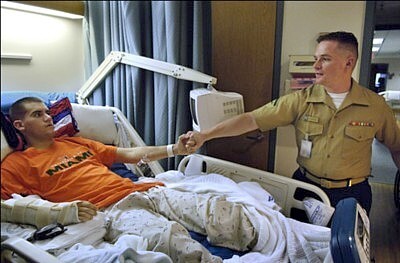At National Naval hospital, marines take care of their own

BETHESDA, MD. – Marine Staff Sgt. Rudy Perez isn't due to get off duty until midnight, but by 7:30 this evening, his day feels complete.
"I see the weight lifted," says Sergeant Perez, watching a sedate but glowing reunion of wounded Cpl.Brian Smith and his family at the National Naval Medical Center.
Here, thanks to Perez and his staff, who carry out a rich interpretation of the fiercely loyal Marine Corp's tradition of caring for its own, the war in Iraq is already a world away for the newly arrived marine. Seriously injured by a roadside bomb in Fallujah, Iraq, days earlier, his arm heavily bandaged, Corporal Smith rests with his family in the womblike fifth floor hospital lounge.
National Naval is where marines most seriously wounded in Iraq are treated. Here, in one of the military's most emotionally gripping assignments, says Perez, "It's our responsibility to take care of the family as if it was our own family."
Perez's liaison unit reunites the wounded with their families and orchestrates all nonmedical aspects of their stay.
Smith's arrival Aug. 29 by medical transport bus marked the end of a long journey. He came in one of three weekly medical airlifts to nearby Andrews Air Force Base from Landstuhl, Germany, where he'd been stabilized. He'd already had two surgeries to repair the "shark bite" arm wounds that left him near death, "You wanted to go ahead and cry tears of happiness," Smith says of his arrival. "But I'm a marine. I can't cry." He calls the liaison unit "the softer side of the Marines."
The 18-strong all-reserve unit serves as a "five-star concierge service" for patients and families, explains Lt. Col. John Worman. Typically there are 20 to 30 in-patient casualties, and they stay an average of four to six weeks. More than 1,500 have been treated here since the beginning of the war, says Ellen Crown, hospital spokeswoman.
Upon hearing of Smith's expected arrival, Perez and his men went to work - making plane reservations for the family, meeting their flight, taking their bags, driving them to hotel rooms, settling them in before bringing them to the hospital. There, the liaison unit briefed the family on the marine's condition before his arrival, and were available round-the-clock for the rest of his stay.
The liaison unit also serves as a clearinghouse for the many offers of assistance to wounded vets. They stock donated paperbacks, CDs, videos, snacks, clothing, and toiletries. They explain benefits and answer questions about pay. They offer everything from Gatorade to a friendly shoulder to streams of family members.
Unit members have arranged a bedside wedding, a citizens' swearing in, a video-conference introduction of a newborn to a hospitalized father. They've managed to ask the wife of a higher-ranking patient to obey regulations and get out of his bed.
They've learned to give the signature "high and tight" haircut, which, when a patient requests it, they take as a signal of sure recovery. They've learned how to deflect, on behalf of a "sleeping" patient, an offer of a visit from a well-meaning celebrity. "This is not a petting zoo," explains Lance Cpl. Carlos Lopes.
Wounded in 2005, Corporal Lopes is part of a contingent of wounded vets helping out as they receive their own outpatient treatment. Liaison work distracts him from worries about his "guys" back in Iraq, and helps him find the sleep that had eluded him. Here, he gowns up visitors, finds takers for donated baseball tickets, sees each patient several times a day, and visits marines transferred to nearby Walter Reed Army Hospital for prostheses. In free moments, he studies criminal justice online.
"We've been taught that there's nothing that can't be done today," explains Lopes, quoting from a deep vein of Marine Corps truisms.
Cindy Smith, the new patient's mother, appreciates the small kindnesses: "They bring us to the hotel, but they walk us right up to the room." Corporal Smith's daughter has to start school, so Mrs. Smith will take her home to Maine. Meanwhile, liaisons will care for the wounded vet's infant son, while his wife, Jennifer, visits her husband.
The Smith family was "an easy one," says Perez. Smith was a "walk off" - an unexpected delight for everyone who gathered at the flag-lined lobby of Building 10 to welcome his arrival.
There are much more emotionally difficult cases to negotiate. The hospital specializes in head-trauma care, and many of the Marines arrive seriously injured, or unconscious, their conditions shocking even to families who have been prepared ahead of time.
Read the rest at the Christian Science Monitor

<< Home